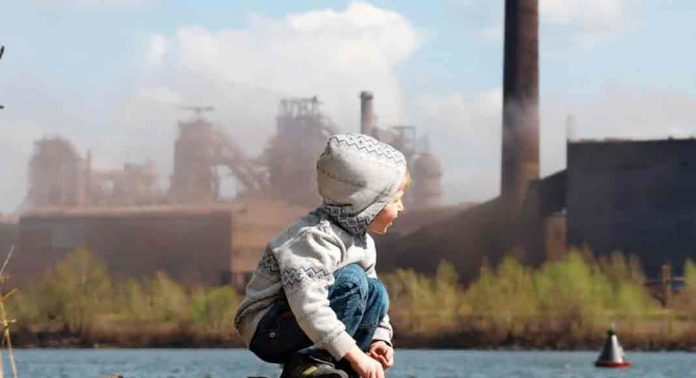The World Health Organization has identified air pollution as “one of the most serious environmental hazards to human health,” alongside climate change, claiming that it kills an estimated 7 million people each year.
“Air pollution is one of the biggest environmental threats to human health, alongside climate change. Improving air quality can enhance climate change mitigation efforts, while reducing emissions will, in turn, improve air quality,” according to the UN’s top health body.
“Every year, exposure to air pollution is estimated to cause 7 million premature deaths and result in the loss of millions more healthy years of life. In children, this could include reduced lung growth and function, respiratory infections and aggravated asthma,” it said.
Meanwhile, the World Health Organization (WHO) has issued new air quality guidelines for the first time since 2005. According to the WHO, the new air quality guidelines (AQGs) seek to save millions of lives from air pollution.
The WHO said in a statement that the new Global Air Quality Guidelines “New World Health Organisation Global Air Quality Guidelines provide clear evidence of the damage air pollution inflicts on human health, at even lower concentrations than previously understood.”
“Since WHO’s last 2005 global update, there has been a marked increase of evidence that shows how air pollution affects different aspects of health. For that reason, and after a systematic review of the accumulated evidence, WHO has adjusted almost all the AQGs levels downwards, warning that exceeding the new air quality guideline levels is associated with significant risks to health,” according to the WHO.
What are the new WHO guidelines?
The new WHO guidelines propose new air quality standards to protect people’s health by lowering levels of critical air contaminants, some of which are also linked to climate change.
The new WHO guidelines prescribe air quality levels for six pollutants: PM 2.5 and PM 10, ozone (O3), nitrogen dioxide (NO2), sulfur dioxide (SO2), and carbon monoxide (CO) (CO). The AQG is a recommendation for particulate matter and other pollutants based on yearly mean concentrations.
PM 10 levels should not exceed 15 g/m3 (micrograms per cubic metre of air) on an annual basis or 45 g/m3 on a 24-hour basis, according to the 2021 recommendations. The limit for PM 10 was 20 g/m3 yearly mean or 50 g/m3 24-hour mean, according to the 2005 guideline.
PM 2.5 levels should not exceed 5 g/m3 on a yearly basis or 15 g/m3 on a 24-hour basis, according to the experts. The limit for PM 2.5, according to the 2005 guideline, was 10 g/m3 annual mean or 25 g/m3 24-hour mean. The AQG limit of another pollutant, Nitrogen Dioxide, was 40 g/m3 annual mean under the 2005 guideline, but the WHO has now lowered it to 10 g/m3.
The health concerns associated with particulate matter (PM) with a diameter of 10 microns or less (PM 10 and PM 2.5, respectively) are of particular public health concern. PM 2.5 and PM 10 can both penetrate deep into the lungs, but PM 2.5 has the ability to reach the circulation, causing cardiovascular and respiratory effects as well as harming other organs.
According to the WHO, PM is largely produced through fuel burning in a variety of sectors, including transportation, energy, households, industry, and agriculture.
It was emphasized that following these rules could save millions of lives.
What are the effects of air pollution on humans?
Ischemic heart disease and stroke are the most common causes of premature death in adults due to outdoor air pollution, and evidence of other impacts such as diabetes and neurological disorders is now emerging, according to the report.
According to the World Health Organization, this puts the burden of disease caused by air pollution on a level with other major global health concerns such as poor diet and cigarette use. Countries will both safeguard their health and mitigate global climate change by attempting to meet these guideline levels, according to the global health organization.
The WHO’s International Agency for Research on Cancer categorized outdoor air pollution and particle matter as carcinogenic in 2013. (IARC).
According to WHO Director-General Tedros Adhanom Ghebreyesus, air pollution is a hazard to people’s health in all countries, but it is more severe in low- and middle-income countries.
“WHO’s new Air Quality Guidelines are an evidence-based and practical tool for improving the quality of air on which all life depends. I urge all countries and all those fighting to protect our environment to put them to use to reduce suffering and save lives,” he said.
According to the WHO, the purpose of the guideline is for all countries to achieve recommended air quality standards. Recognizing that this will be a challenging undertaking for many countries and regions suffering from high levels of air pollution, the WHO has suggested interim targets to allow for modest but considerable improvements in air quality and consequently health benefits for the population.
According to a WHO fast scenario analysis, “Almost 80 percent of deaths related to PM 2.5 could be avoided in the world if the current air pollution levels were reduced to those proposed in the updated guidelines.”
Apart from it, you can read these articles: KProxy, Kung Fu Panda 4, 7StarHD, 123Mkv, Afdah, FFMovies, Bolly4U, Moviesflix, TrueID, Crystals for Protection, Mewing, How to charge crystals, Knightfall Season 3, Vampire Diaries season 9, Homeland Season 9, Sherlock season 5, Goodyear Viva 3, High sleeper bed, Cash for Cars, F95zone, Aloe Vera Juice, the 100 season 8, Salvation Season 3, Shadowhunters season 4, Poldark season 6, Good Place season 5, Madison beer net worth, Gravity Falls season 3, Hunter x Hunter season 7, Marvelous Mrs. Maisel Season 4, Bloodborne 2, Derry Girls season 3, highest paid CEO, and, Bhushan Kumar net worth, Knightfall Season 3, you can follow our Entertainment, Health, Technology, and Business category.



















![10 Countries With the Best Healthcare in the World [Statistical Analysis] Countries With the Best Healthcare in the World](https://articleify.com/wp-content/uploads/2025/07/Countries-With-the-Best-Healthcare-in-the-World-1-150x150.jpg)









